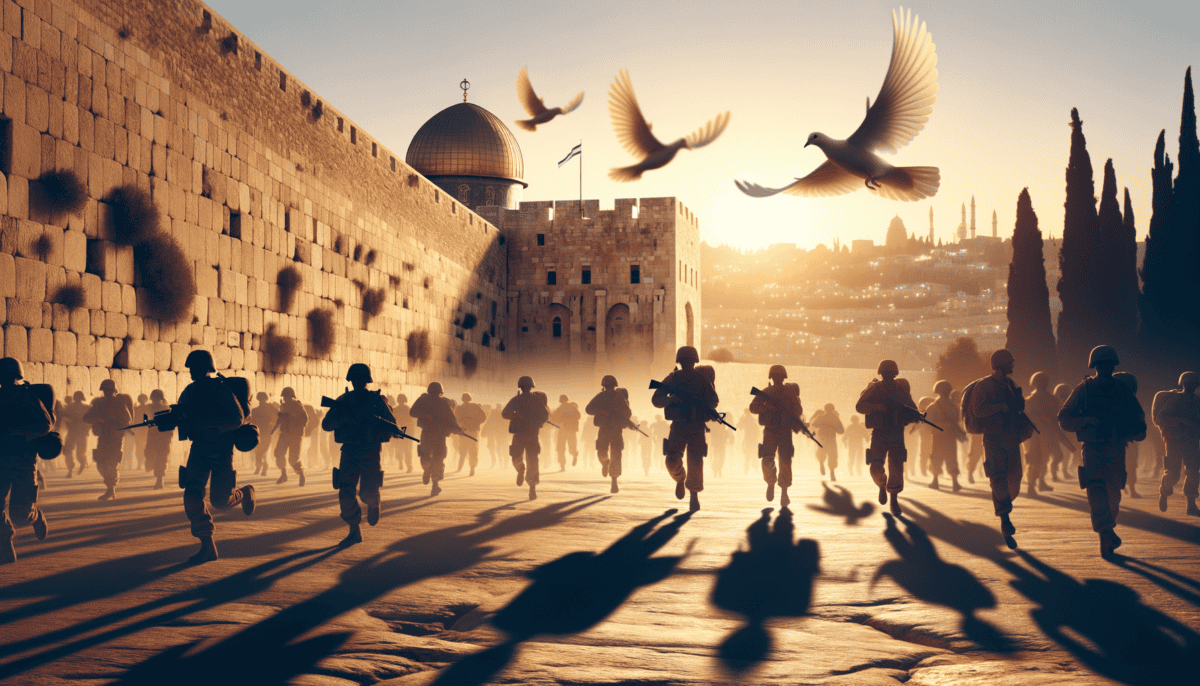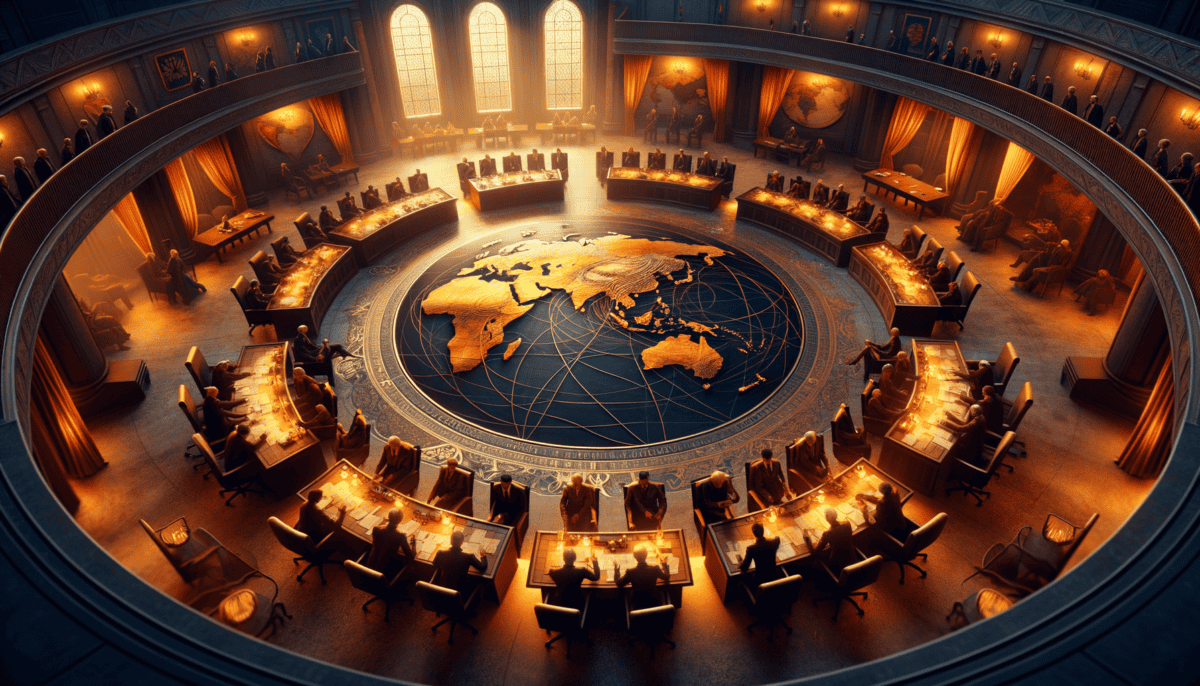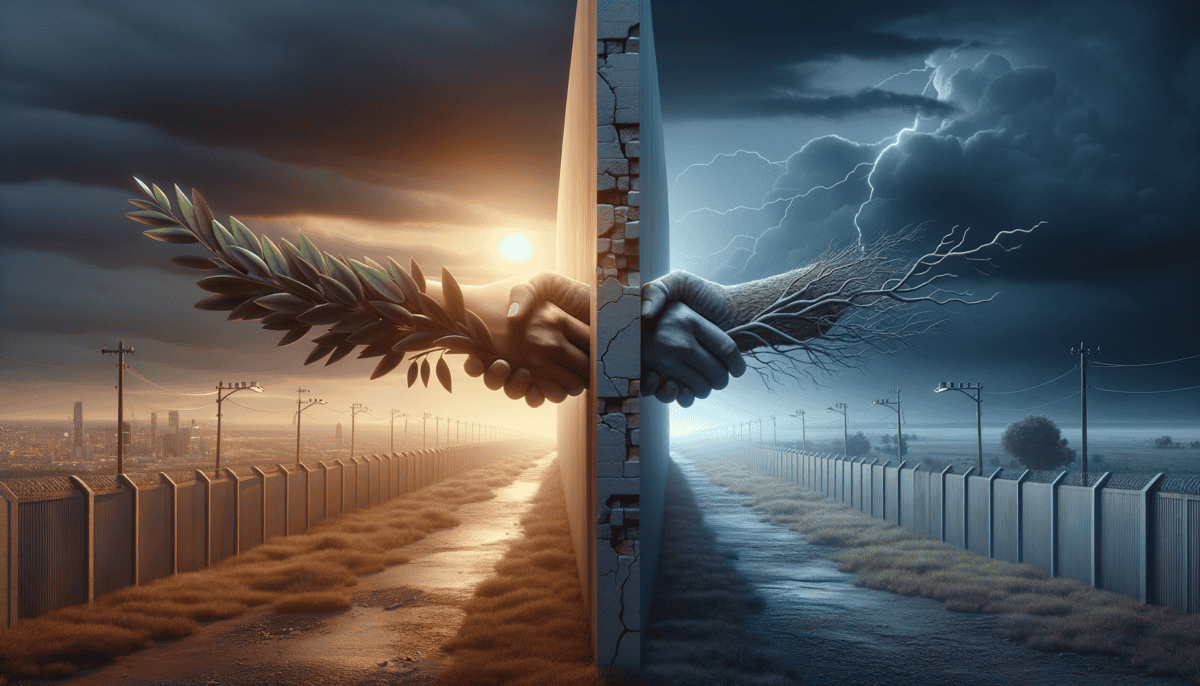Tensions Rising
The sun beat down on the dusty streets of Jerusalem in May 1967. Sarah, a young girl with curious eyes, watched as more soldiers filled the streets each day. Something big was happening, but she didn't understand what.
"Why are there so many soldiers, Papa?" Sarah asked, tugging on her father's sleeve.
Her father looked down with worried eyes. "Many countries around us are angry with Israel, sweetheart. The soldiers are here to keep us safe."
Life in the Middle East was getting scary. Egypt, Syria, and Jordan – countries that shared borders with Israel – were not happy. They didn't want Israel to be there at all.
President Gamal Abdel Nasser of Egypt made angry speeches on the radio. He moved lots of soldiers close to Israel's borders. Syria did the same thing. It was like having mean neighbors crowd around your fence, looking ready to jump over at any time.
"We must be ready," said Israel's leader, Levi Eshkol, in a quiet voice that carried much worry. The Israeli army began getting ready too. Young men and women left their homes to join the army. They practiced with their equipment and prepared for what might come.
Sarah noticed more changes in her neighborhood:
• People were:
- Filling sandbags for protection
- Taping windows to prevent shattering
- Storing extra food and water
- Building bomb shelters
- Learning emergency procedures
The World Watches and Worries
Far away, other countries watched with concern. The United States tried to help keep peace, but it wasn't working. The Soviet Union (now called Russia) supported Egypt and Syria, making things even more complicated.
"Will there be war, Mama?" Sarah asked one evening as she helped tape the windows.
Her mother hugged her tight. "We hope not, little one. But if there is, we are ready." ❤️
Every day brought more tension. Soldiers checked their weapons. Families stored extra supplies. Radio announcements became more frequent. The whole country felt like it was holding its breath, waiting.
– Egyptian forces in the south
– Syrian forces in the north
– Jordanian forces in the east
At night, Sarah could hear the rumble of military vehicles moving through the streets. The sound of boots marching became as common as birds chirping. Everyone knew something big was about to happen, but nobody knew exactly what or when.
One evening, Sarah found her parents whispering in the kitchen. "The Arabs have almost half a million soldiers," her father said softly. "And thousands of tanks."
"But we have something stronger," her mother replied firmly. "We have no choice but to win. This is our only home."
As May turned to June, the air grew thick with anticipation. Sarah noticed how adults would stop talking when children walked by. How they would gather around radios, listening intently to every news update. How they would scan the skies more often.
Military planes flew overhead more frequently. The sound of their engines made everyone look up, wondering if this was it – if this was the moment everything would change. But day after day, life continued in this strange, tense way.
"Remember," Sarah's teacher told her class, "if you hear the sirens, you know what to do. Stay calm and follow the adults to the shelter."
The children nodded seriously. Even they could feel that something important was about to happen. Something that would change their lives forever.
The First Strike
The morning of June 5, 1967, started quietly. The sun had barely peeked over the horizon when Israeli pilots rushed to their planes. They had trained for this moment for weeks. ️
“Today is the day,” whispered Captain David to his squadron. “Operation Focus begins now.”
At 7:45 AM, waves of Israeli planes soared through the morning sky. They flew very low, almost touching the water of the Mediterranean Sea. This helped them avoid being spotted by radar.
“Look how close we are to the waves!” one young pilot exclaimed. “The Egyptian radar won’t see us coming!”
The Surprise Attack
The Egyptian air force wasn’t ready. Many pilots were still eating breakfast. Their planes sat lined up neatly on runways, like toys waiting to be played with.
Commander: “Another quiet morning then.”
*Suddenly, the sound of explosions filled the air*
Israeli planes swooped down from the sky. In just a few hours, they destroyed:
- Hundreds of Egyptian planes
- Many runways
- Fuel storage tanks
- Control towers
- Air defense systems
Back in Jerusalem, Sarah and her family heard the news on the radio. “Our air force has taken action,” the announcer said. Sarah’s father nodded grimly. “It has begun.”
The World Reacts
News of the attack spread quickly around the world. Leaders of different countries were shocked. Nobody expected such a bold move from Israel.
– Jordan started shooting at Israel
– Syria sent planes to attack
– Iraq promised to help too
“Papa, are we winning?” Sarah asked, hearing the excitement in people’s voices.
“Yes, little one,” her father replied. “But the war is just beginning.” ⚔️
By afternoon, Israel had destroyed most of Egypt’s air force. But Jordan and Syria were now attacking too. Israeli planes had to fight on three sides at once!
That night, as air raid sirens wailed, Sarah huddled with her family in their shelter. “Why did we attack first?” she asked.
Her mother explained gently, “Sometimes, when you know someone is going to hurt you, you have to act first to protect yourself.”
Outside, the sounds of war continued. Israel’s surprise attack had worked better than anyone expected. But this was only the first day. Nobody knew what tomorrow would bring.
Military radio crackled with reports from pilots returning from their missions. Each landing plane brought news of more success. The first strike had changed everything. Now, the real fighting would begin on the ground.
“Get some rest,” Sarah’s father told her. “Tomorrow will be another important day.” The family settled in for a long night, knowing that the war had only just begun.
Lightning Ground Assault
As the sun rose on June 6, tanks rumbled across the desert sand. The ground shook like thunder. Israeli soldiers were ready to move fast!
“Forward, everyone!” called Commander Moshe. “We must be quick like lightning!”
Racing Through the Sinai
In the hot Sinai Desert, Israeli tanks zoomed forward. They moved so fast that Egyptian soldiers were surprised!
“Look at our tanks go!” young soldier Danny said with excitement. “They’re like fast cars in a race!”
Driver: “Yes sir! We’re going as fast as we can!”
*The tanks kicked up huge clouds of sand as they raced forward*
Back home, little Sarah listened to the radio with her family:
“Our brave soldiers are moving through the Sinai Desert. They have already gone very far. The Egyptian army is running away!”
Fighting in the West Bank
On another side of Israel, soldiers moved into the West Bank. They had to be extra careful here because there were lots of hills and towns. ️
“Watch those hilltops,” warned Sergeant Rachel. “Move slowly and stay safe.”
• Some soldiers went up hills
• Others drove tanks through valleys
• Planes flew overhead to help
• Radio teams stayed in touch with each other
The Tough Golan Heights
The hardest fighting was in the Golan Heights. It was very high up, with lots of big rocks and steep hills. ️
“This is like climbing a giant staircase,” said one tired soldier. “But we must keep going!”
Sarah’s brother, a soldier named David, sent a letter home:
“Dear family, The fighting is hard but we are winning. Our tanks and planes work together perfectly. Everyone is being very brave. Don’t worry about me. Love, David” ❤️
Big Changes Happening Fast
By the end of the day, Israel had captured lots of land:
- Most of the Sinai Desert
- Big parts of the West Bank
- They were starting to climb the Golan Heights
“Papa, how can our soldiers move so fast?” Sarah asked that night.
“They trained very hard,” her father explained. “And they work together like a team playing sports.”
That night, while Sarah slept, the fighting continued. Soldiers moved through the darkness, guided by the stars above. They knew tomorrow would bring more challenges, but they were ready. The war was moving faster than anyone had expected.
Battle for Jerusalem
The city of Jerusalem was very special. It had tall stone walls and buildings that were hundreds of years old. People from many different religions loved this city.
The Fight Begins
Israeli soldiers walked carefully through the narrow streets. The stones under their feet were smooth from thousands of years of footsteps.
“Be very careful,” whispered Captain Maya. “We must protect these old buildings. They are very important.”
Captain: “Yes, they tell stories from long ago.”
*The morning sun made the stone walls glow golden*
The Western Wall
The most exciting moment was when the soldiers reached the Western Wall. It was a huge wall made of giant stones. Many Jewish people had dreamed of seeing it for years. ️
“When we got to the Wall, even the toughest soldiers had tears in their eyes. It was like finding a long-lost friend.” – Soldier’s diary
Back in her home, Sarah heard the news on the radio:
• Israeli soldiers reached the Western Wall
• People were crying with joy
• Soldiers blew a special horn called a shofar
• Everyone wanted to touch the ancient stones
Life in the City
Regular people in Jerusalem stayed in their homes during the fighting. They were brave and helped each other.
“We shared our food with our neighbors,” said Mrs. Cohen, who lived in the city. “We told stories to keep the children happy.”
A City United
For the first time in many years, all of Jerusalem was together as one city. People could walk freely to places they couldn’t visit before.
“Now I can visit my old neighborhood!” said Mr. Levy, an old man who lived in Jerusalem. “I haven’t seen it in twenty years!”
That evening, Sarah asked her grandmother about Jerusalem:
“Grandma, why is everyone so happy about the Western Wall?”
“Because it’s like finding a piece of our heart that was missing for a long time,” Grandma explained with a smile. ❤️
As the sun set over Jerusalem, the city was quiet again. The ancient stones had seen another big change. People hoped this would bring peace to the beautiful old city. Soldiers patrolled the streets gently, careful to protect every precious stone and building.
World Watches and Waits
The whole world was talking about the war. Big leaders from many countries had meetings to figure out what to do.
United Nations Talks
At the United Nations, people from different countries sat in a big room. They wanted to help make peace. ️
“We need to stop the fighting,” said Mr. Smith from America.
“Everyone needs to feel safe,” added Mrs. Lee from another country.
New Friends and Old Friends
Some countries became closer friends with Israel. Other countries were upset about the war. It was like a big puzzle that needed solving.
“We must learn to live together in peace,” said a wise leader at the talks. “Our children deserve a better future.”
Changes in the Region
Things were different now in the Middle East. Here are some big changes:
• Israel became stronger
• Some borders moved
• People had to make new rules
• Everyone wanted peace
Hope for Peace
Sarah watched the news with her family. She saw people talking about peace on TV.
“Daddy, will there be peace now?” she asked.
“We hope so, sweetie,” her father answered. “Many people are working hard to make that happen.”
New Beginnings
People started thinking about how to make life better. They wanted to build new roads and schools. They hoped children could play together safely.
Doctors helped people from all sides.
Farmers shared their food with neighbors.
That evening, Sarah drew a picture of a dove holding an olive branch. Her teacher had told her this was a symbol of peace. She hung it on her wall, hoping for better days ahead.
“Maybe one day,” her mother said, looking at the drawing, “all children will play together without worry.” ❤️
As the sun set, people everywhere hoped the talks would bring good news. They wanted their children to grow up in a peaceful world. The big leaders kept meeting, trying to find ways to make everyone happy and safe.
A New Middle East
The Six Day War changed everything. The world would never be the same. Little kids today still learn about what happened during those six amazing days.
Stories from Both Sides
David, now a grandpa, remembers being a young soldier: “We were scared but brave. We just wanted everyone to be safe.”
Hassan, who lived in a small village, shares his memory: “Everything changed so fast. Now I teach my grandchildren about hoping for peace.”
Big Changes
New roads were built.
People had to learn to live with new neighbors.
“The world watched us for six days,” says Mrs. Cohen, a teacher. “Now they still watch to see if we can make peace.”
Learning from History
Today, kids like you learn about the Six Day War in school. Here’s what changed:
• The war lasted only six days
• Many lives changed forever
• People still talk about peace
• We must learn from the past
Hope Grows
Sarah’s granddaughter now plays in a park where tanks once rolled.
“Grandma, tell me about the dove drawing you made,” the little girl asks.
Sarah smiles. “I drew it hoping for peace. Now you can draw your own peace picture too.”
Looking Forward
New leaders work to make things better. Children from different places play together at special peace camps. People share stories and try to understand each other.
Artists paint pictures of hope.
Writers tell stories about friendship.
The Six Day War taught us that big changes can happen fast. But it also showed us that peace takes time and everyone needs to work together. Today, many people work hard to make sure all children can grow up safe and happy.
As the sun rises each morning, it shines on a land where hope grows stronger every day. Maybe someday, all the peace drawings children make will come true.






